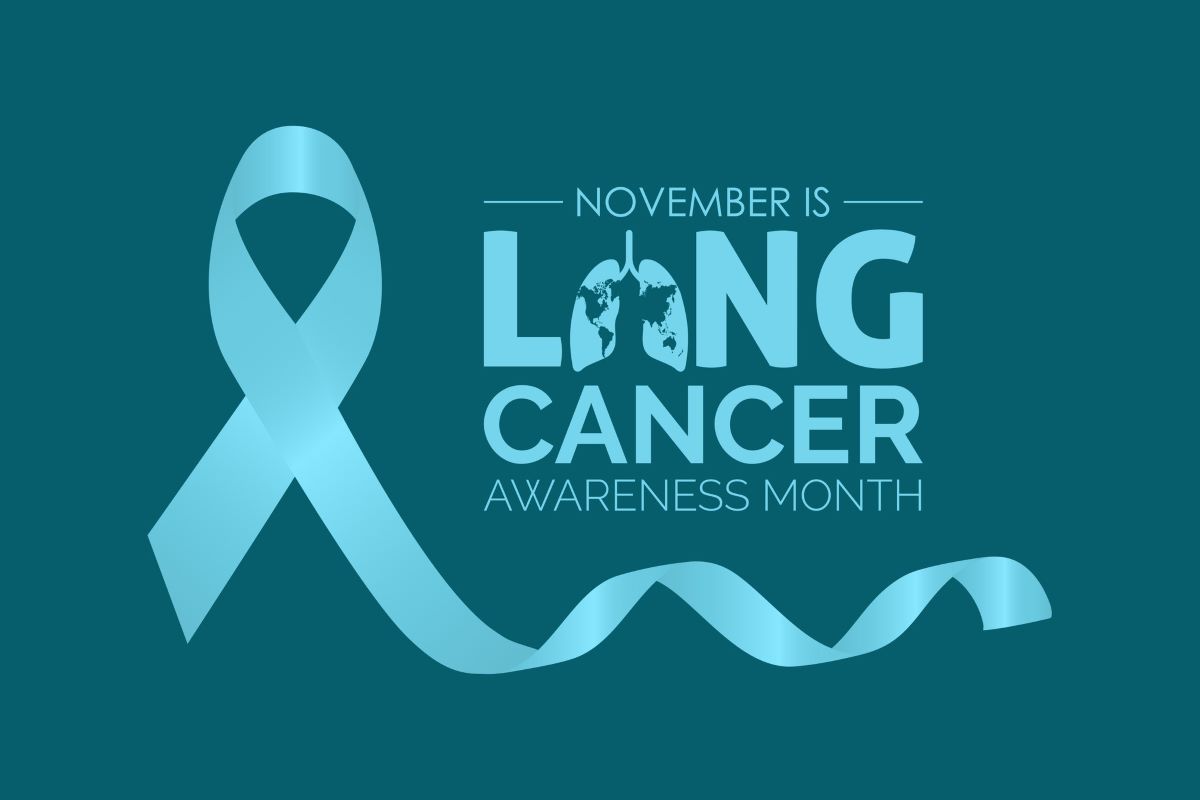
As we observe Lung Cancer Awareness Month this November, it’s crucial to reflect on the remarkable progress being made in the fight against this deadly disease. Lung cancer remains the leading cause of cancer-related deaths worldwide, with over 230,000 new cases diagnosed each year in the United States alone.1 Risk factors such as smoking, environmental pollutants, genetic predispositions and occupational exposures significantly contribute to the risk of lung cancer. Early detection and screening for high-risk populations, especially with low-dose CT scans, are improving outcomes, but advancements in treatment are truly revolutionizing the landscape of care.
Understanding lung cancer: Classification and evolution
Lung cancer is primarily divided into two categories: non-small cell lung cancer (NSCLC) and small cell lung cancer (SCLC). While SCLC is known for its aggressive behavior and rapid spread, NSCLC makes up around 85% of lung cancer cases. Historically, NSCLC was classified based on tumor morphology — such as adenocarcinoma, squamous cell carcinoma and large cell carcinoma — but recent years have ushered in a more nuanced understanding. We now categorize NSCLC more by molecular mutations than by histological subtypes. This precision in classification has led to personalized, targeted treatment strategies.
A multi-disciplinary approach
At Northside Hospital, we recognize that collaboration is key to delivering comprehensive cancer care. Through our lung nodule and multidisciplinary lung cancer clinics, we bring together a team of specialists — including radiologists, pathologists, pulmonologists, surgeons, radiation and medical oncologists — to review cases and assess clinical trial eligibility every week. This integrated approach ensures that each patient receives personalized, expert-driven care.
Treatment advances in localized lung cancer
In localized lung cancer, we’ve seen significant strides, particularly with the introduction of immunotherapy. For example, in patients with unresectable stage III NSCLC and limited stage SCLC, immunotherapy has become a mainstay in the adjuvant setting following concurrent chemoradiotherapy (CRT),2-4 with significant improvement in progression-free survival and overall survival. Moreover, in patients with resectable stage IB to IIIB NSCLC, adding immunotherapy to chemotherapy before the surgery has also become the standard of care in recent years. Clinical trials like CheckMate 8165 and Keynote 6716 have been pivotal in shaping this evolving treatment paradigm.
In addition to immunotherapy, targeted therapies are making waves in the adjuvant setting. Osimertinib, for instance, is not only the standard treatment after surgery7 but also becomes the standard after CRT8 for patients with EGFR-mutant NSCLC. Similarly, for patients with ALK-positive NSCLC, adjuvant Alectinib has shown promise9 and obtained FDA approval in 2024.
Treatment advances in metastatic lung cancer
For patients with metastatic lung cancer, the treatment landscape has been revolutionized by the advent of chemo-immunotherapy, with landmark trials such as Keynote 189, IMpower 150, CheckMate 227 and CheckMate 9LA leading the way.10-13 These combinations have now become the standard of care in the first-line setting, offering patients hope for longer and better-quality lives.
In addition to chemo-immunotherapy, we’re witnessing unprecedented advances in targeted treatments, a manifestation of precision medicine at its finest. These therapies target specific genetic mutations that drive tumor growth, offering patients personalized and effective treatment options. Here are just a few of the examples that have obtained FDA approval in recent years: Trastuzumab deruxtecan in HER2-mutant NSCLC,14 Osimertinib combined with chemotherapy15 or combination of Amivantinib and Lazertinib in EGFR-mutant NSCLC,16 as well as Adagrasib17 and Sotorasib18 for KRAS G12C mutant NSCLC, marking a significant breakthrough for a mutation that was previously considered untreatable.
Lastly, we are excited to witness the introduction of Tarlatamab, a bispecific treatment, into the therapeutic arsenal for SCLC.19 This innovative immunotherapy targets and binds T cells to SCLC cells, facilitating cancer cell death. Early clinical data has demonstrated durable responses and encouraging overall survival outcomes, offering new hope for patients with this aggressive disease.
Looking ahead
The landscape of lung cancer treatment is evolving rapidly and the breakthroughs we are witnessing today were unimaginable just a decade ago. From immunotherapy to precision medicine, patients now have more options than ever, offering hope where there was once little. As we continue to make strides in research, early detection and treatment, it is crucial to raise awareness, support ongoing clinical trials and ensure that patients have access to the life-saving treatments they deserve.
Lung cancer remains a formidable opponent, but through innovation, collaboration and compassion, we are closer than ever to transforming it from a deadly disease into a manageable condition. In this Lung Cancer Awareness Month, let’s celebrate the advances made and continue our efforts toward a future where lung cancer is no longer a death sentence.
- R.L. Siegel, A.N. Giaquinto, and A. Jemal, "Cancer Statistics, 2024," CA: A Cancer Journal for Clinicians 74, no. 1 (2024): 12–49.
- E. Felip et al., "Adjuvant Atezolizumab after Adjuvant Chemotherapy in Resected Stage IB–IIIA Non-Small-Cell Lung Cancer (IMpower010): A Randomised, Multicentre, Open-Label, Phase 3 Trial," The Lancet 398, no. 10308 (2021): 1344–1357.
- S.J. Antonia et al., "Durvalumab after Chemoradiotherapy in Stage III Non-Small-Cell Lung Cancer," The New England Journal of Medicine 377, no. 20 (2017): 1919–1929.
- Y. Cheng et al., "Durvalumab after Chemoradiotherapy in Limited-Stage Small-Cell Lung Cancer," The New England Journal of Medicine (2024).
- P.M. Forde et al., "Neoadjuvant Nivolumab Plus Chemotherapy in Resectable Lung Cancer," The New England Journal of Medicine 386, no. 21 (2022): 1973–1985.
- H. Wakelee et al., "Perioperative Pembrolizumab for Early-Stage Non-Small-Cell Lung Cancer," The New England Journal of Medicine 389, no. 6 (2023): 491–503.
- M. Tsuboi et al., "Overall Survival with Osimertinib in Resected EGFR-Mutated NSCLC," The New England Journal of Medicine 389, no. 2 (2023): 137–147.
- S. Lu et al., "Osimertinib after Chemoradiotherapy in Stage III EGFR-Mutated NSCLC," The New England Journal of Medicine 391, no. 7 (2024): 585–597.
- Y.L. Wu et al., "Alectinib in Resected ALK-Positive Non-Small-Cell Lung Cancer," The New England Journal of Medicine 390, no. 14 (2024): 1265–1276.
- L. Gandhi et al., "Pembrolizumab Plus Chemotherapy in Metastatic Non-Small-Cell Lung Cancer," The New England Journal of Medicine 378, no. 22 (2018): 2078–2092.
- M.A. Socinski et al., "Atezolizumab for First-Line Treatment of Metastatic Nonsquamous NSCLC," The New England Journal of Medicine 378, no. 24 (2018): 2288–2301.
- M.D. Hellmann et al., "Nivolumab Plus Ipilimumab in Advanced Non-Small-Cell Lung Cancer," The New England Journal of Medicine 381, no. 21 (2019): 2020–2031.
- L. Paz-Ares et al., "First-Line Nivolumab Plus Ipilimumab Combined with Two Cycles of Chemotherapy in Patients with Non-Small-Cell Lung Cancer (CheckMate 9LA): An International, Randomised, Open-Label, Phase 3 Trial," The Lancet Oncology 22, no. 2 (2021): 198–211.
- B.T. Li et al., "Trastuzumab Deruxtecan in HER2-Mutant Non-Small-Cell Lung Cancer," The New England Journal of Medicine 386, no. 3 (2022): 241–251.
- D. Planchard et al., "Osimertinib with or without Chemotherapy in EGFR-Mutated Advanced NSCLC," The New England Journal of Medicine 389, no. 21 (2023): 1935–1948.
- B.C. Cho et al., "Amivantamab Plus Lazertinib in Previously Untreated EGFR-Mutated Advanced NSCLC," The New England Journal of Medicine (2024).
- P.A. Janne et al., "Adagrasib in Non-Small-Cell Lung Cancer Harboring a KRAS(G12C) Mutation," The New England Journal of Medicine 387, no. 2 (2022): 120–131.
- F. Skoulidis et al., "Sotorasib for Lung Cancers with KRAS p.G12C Mutation," The New England Journal of Medicine 384, no. 25 (2021): 2371–2381.
- M.J. Ahn et al., "Tarlatamab for Patients with Previously Treated Small-Cell Lung Cancer," The New England Journal of Medicine 389, no. 22 (2023): 2063


